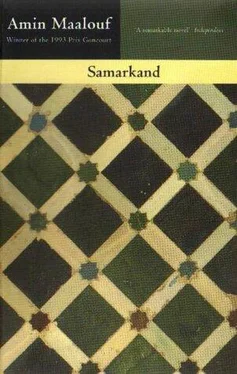Is the truth to be found in the Samarkand Manuscript? The chronicle which runs along the margins asserts that the three men met for the first time in Isfahan, in the diwan of the Grand Vizir, on the initiative of Khayyam — acting as destiny’s blind apprentice.
Nizam had secluded himself in the palace’s small hall and was surrounded by papers. As soon as he saw Omar’s face in the doorway he understood that his response would be negative.
‘So, you are indifferent to my projects.’
Khayyam replied, contritely but firmly:
‘Your dreams are grandiose and I hope that they will be realized, but my contribution cannot be what you have proposed. When it comes to secrets and those who reveal them, I am on the side of the secrets. The first time an agent came to me to report a conversation, I would order him to be silent, state that it was neither my business nor his and I would ban him from my house. My curiosity about people and things is expressed in a different way.’
‘I respect your decision and do not deem it useless for the empire that some men devote themselves completely to science. Naturally, you will still receive everything I promised you — the annual sum of gold, the house, the observatory. I never take back what I have given of my own accord. I would have wished to be able to associate you more closely with my work, but I take consolation in the fact that the chronicles will write for posterity that Omar Khayyam lived in the era of Nizam al-Mulk and that he was honoured, sheltered from bad weather and was able to say no to the Grand Vizir without risking disgrace.’
‘I do not know if I will ever be able to show the gratitude which your magnanimity deserves.’
Omar broke off. He hesitated before continuing:
‘Perhaps I may be able to make you forget my refusal by presenting to you a man I have just met. He is a man of great intelligence, his knowledge is immense and his genius is disarming. He seems just right for the office of sahib-khabar and I am sure that your proposal will delight him. He conceded to me that he had come from Rayy to Isfahan with the firm hope of being employed by you.’
‘An ambitious man,’ Nazim murmured between his teeth. ‘But that is my fate. When I find a trustworthy man, he lacks ambition and scorns the apparatus of power; and when a man appears ready to jump at the first office I offer him, his haste unnerves me.’
He seemed tired and resigned.
‘By what name is this man known?’
‘Hassan, son of Ali Sabbah. I must warn you, however, that he was born in Qom.’
‘A Shiite missionary? That does not worry me, even though I am hostile to all heresies and all deviations. Some of my best collaborators are sectarians of Ali, my best soldiers are Armenians and my treasurers are Jews, but that does not mean that I withhold my trust and protection from them. The only ones I distrust are the Ismailis. I do not suppose that your friend belongs to that sect?’
‘I do not know. However, Hassan has come here with me. He is waiting outside. With your permission I will summon him and you will be able to question him.’
Omar disappeared for a few seconds and came back accompanied by his friend, who did not appear in the least intimidated. However, Khayyam could make out two muscles in Hassan’s beard which were flexing and shaking.
‘I present Hassan Sabbah. Never has such a tightly-wound turban held such knowledge.’
Nizam smiled.
‘Here I am surrounded by the learned. Is it not said that the prince who frequents and keeps the company of scholars is the best of princes?’
It was Hassan who retorted:
‘It is also said that the scholar who keeps the company of princes is the worst of scholars.’
An unaffected but brief laugh drew them together. Nizam was already knitting his brows. He wanted the inevitable series of proverbs which preceded any Persian conversation to be over quickly, in order to make clear to Hassan what he expected of him. Curiously enough, from the very first words they found themselves in collusion. It now only remained for Omar to slip away.
Thus Hassan Sabbah very quickly became the indispensable collaborator of the Grand Vizir. He had succeeded in setting up an elaborate network of agents disguised as merchants, dervishes and pilgrims, who criss-crossed the Seljuk empire, not letting any palace, house or bazaar out of their earshot. Plots, rumours and scandals were all reported, exposed and thwarted in either a discreet or an exemplary manner.
At first, Nizam was overjoyed at having the fearsome machinery under his control. He elicited some satisfaction from the Sultan, who had previously been reticent. Had not his father, Alp Arslan, recommended that he abhor this type of politics? ‘When you have planted spies everywhere,’ he had warned, ‘your true friends will not be on their guard since they know that they are loyal. But the felons will be on the look-out. They will want to bribe the informers. Gradually you will start receiving reports which are unfavourable to your true friends and favourable to your enemies. Good or bad words are like arrows, when you fire many there is always one which hits its target. Your heart will then be hardened against your friends, the felons will take their place at your side, and what will be left of your power?’
It needed a woman from the harem to be caught in the act of poisoning someone to make the Sultan stop doubting the usefulness of his chief of spies and overnight he made him his confidant. However, it was Nizam who took umbrage at the friendship which sprang up between Hassan and Malikshah. The two men were young, and they would happily chat together at the expense of the old Vizir, particularly on Fridays, the day of the shölen , the traditional banquet held by the Sultan for his court.
The first part of the festivities was strictly formal and restrained. Nizam was seated to the right of Malikshah. They were encircled by men of letters and intellectuals and discussions took place on the most varied of subjects from the comparative merits of Indian or Yemenite swords to the various works of Aristotle. The Sultan fleetingly showed a passion for this sort of sparring, then he faded out and his eye started to wander. The Vizir understood that it was time to leave, and the noble guests followed him. They were instantly replaced by musicians and dancers, jugs of wine were tipped and the drinking bout, which would be restrained or wild accordingly to the humour of the prince, would continue into the morning hours. To a couple of chords from the rebec, the lute or the târ , singers improvised on their favourite theme — that of Nizam al-Mulk. The Sultan, who was incapable of doing without his Grand Vizir, avenged himself by laughing freely. One just had to see the infantile frenzy with which he clapped, to know that one day he would manage to hit out at ‘his father’.
Hassan was adept at feeding the sovereign’s every sign of resentment toward his Vizir. Upon what did the Vizir pride himself? His wisdom, his learning? But Hassan could make short shrift of both these qualities. The Vizir’s capacity to defend the throne and the empire? Hassan very quickly had shown himself equally competent. The Vizir’s constancy? There was nothing simpler than to affect loyalty, which anyhow never rings truer than in the mouths of liars.
Above all, Hassan knew how to cultivate Malikshah’s proverbial avarice. He constantly spoke to him of the Vizir’s expenses, and brought to his attention the new robes of the Vizir and his associates. Nizam liked power and its apparatus, but Hassan liked only power and was rigorous in its pursuit.
When he felt that Malikshah was totally won over and ready for his eminence grise to be delivered the death blow, Hassan created the incident. The scene unfolded in the throne room, one Saturday. The Sultan had woken up at mid-day with an annoying headache. He was in a foul temper, and became exasperated upon learning that sixy thousand golden dinars had just been distributed to the soldiers of the Vizir’s Armenian guard. The information had to have come from Hassan and his network. Nizam patiently explained that in order to avoid any hint of insubordination he had to feed the troops and fatten them up a little, and that if the troops reached the point of rebellion the state would have to spend that amount ten times over. Throwing gold around by the armful, retorted Malikshah, meant that they would end up not being able to pay salaries and then the real rebellions would begin. A good government surely had to know how to keep its gold for the difficult times?
Читать дальше












